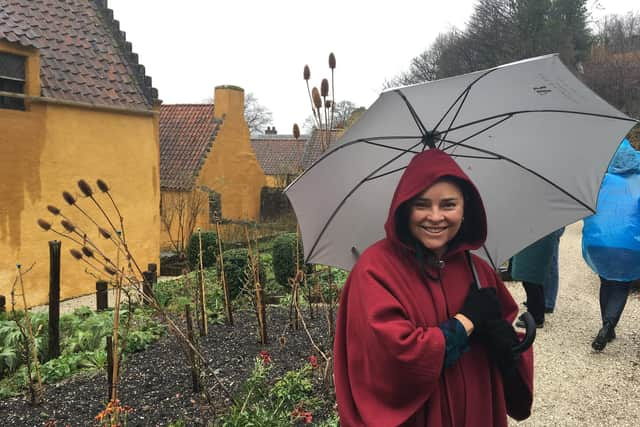Outlander author Diana Gabaldon says demise of the word 'Scotch' linked to rise of SNP
Ms Gabaldon made the claim after responding to a fan who asked about the type of hat worn by a ghostly character in an early episode of the blockbuster show.
She described the hat as a “Scotch bonnet and said “all the Scots” used the word Scotch, with the author then aligning the demise of the term with the rise of the SNP.
Advertisement
Hide AdAdvertisement
Hide AdThe writer tweeted: "He’s wearing a Scotch bonnet (yes, I do mean Scotch) with a feather in it--very traditional (hence the "Scotch" -- EVERYONE (including all the Scots) used that term until the SNP got into power in the mid-20th c.)."


Ms Gabaldon later went on to claim there were “several shifts” in usage that occurred through the middle of the 20th century and “these correlated roughly with the growth of the SNP into visibility”.
She said: “I don't mean to imply that the SNP dictated a change from ‘Scotch’ to ‘Scot/Scots/Scottish’ (or that they _could_); merely that I see the linguistic change occurring roughly parallel with the emergence of the party. Chance is that an underlying development of nationalistic feeling was driving both political and linguistic developments.”
The term Scotch emerged in the 16th century and was typically used by the English to describe Scots. It appeared in Scottish literature in the late 18th century, including Burns.
It was around this time that use of the word was questioned, with Scotch falling out of fashion in the 19th century, with the word long regarded as a dated term and insulting or vulgar to some. By the 20th century, use of the word in England and Scotland started to fade.
Ms Gabaldon later issued a fuller explanation of her claim that it was historically accurate to use the term Scotch Bonnet.
The hat she was describing is a tam o’ shanter, which might be more broadly known as a bunnet, with a Scotch Bonnet the name of a super hot chilli typically used in West Indian Cuisine and a mushroom.
She said: “I actually do quite a bit of research when writing these books (and have been doing, for the last 35 years).
Advertisement
Hide AdAdvertisement
Hide Ad"A lot of said research involves reading things written by actual Scottish people – both fiction and non-fiction – and that's why I feel reasonably OK about saying that most things written by Scottish people through the late 18th, 19th and early 20th centuries used the word ‘Scotch’ without the slightest blush. I have (for example) a book written by Sir Harry Lauder.”
She referenced My Best Scotch Stories by entertainer Sir Harry Launder, who enjoyed huge success in the United States at the turn of the 20th century, and the song I Love a Lassie (Or Ma Scotch Bluebell), with the sheet music published by London-based Francis, Day and Hunter in 1906.
Ms Gabaldon added: “Granted, Sir Harry was a ‘stage Scotchman’, and thus perhaps not totally representative of linguistic norms , but he is evidence that no one at the time thought there was anything wrong with the word ‘Scotch’ as being an adjective implying that whatever it was had something to do with Scotland.
“Today, though, the majority of non-Scottish people I talk to (about Scotland or the books or the show) are extremely careful to use only the word ‘Scot’, while sedulously avoiding ‘Scotch’ (even when they really ought to be using ‘Scots’ or ‘Scottish’ as the adjectival form). That's why I inserted the parenthetical remark indicating that ‘Scotch Bonnet’ was historical and as such, in no way offensive."
According to the Oxford English Dictionary, the contraction of Scottish to Scotch was first recorded in late Middle English in the compound Scotchman, with Scotch superseding Scottish in all English registers from the second half of the 16th century to the 19th century.
Scotch first appears in Scotland in the late 16th century, but Scots and Scottish were preferred in literary use.
By the end of the 18th century – and partly reflecting the vogue for Anglicisation – Scotch became accepted in literary use and was frequently used, including by Burns. However, certainty over its usage started to emerge around the same time.
In the 19th century, Scotch appears in official language in Scotland – reflecting use in London – with the Scotch Education Department formed in 1872. The name was later changed to the Scottish Education Department in 1918.
Advertisement
Hide AdAdvertisement
Hide AdThe dictionary added: "Uncertainty among the educated classes in Scotland concerning the relative ‘correctness of the three competing terms may be noted as early as the late 18th century, and by the mid 19th century there is a growing tendency among educated speakers to favour the more formal Scottish or (less frequently) the more traditional Scots over what was perceived as the more vulgar Scotch.
"By the beginning of the 20th century, disapproval of Scotch by educated Scots was so great that its use had become something of a shibboleth, much to the bafflement of speakers outside Scotland for whom this was the usual word.
"During the 20th century, educated usage in England gradually began to adapt in deference to the perceived Scottish preferences.” The dictionary also stated Scotch has remained in common use among working-class Scots.
Comments
Want to join the conversation? Please or to comment on this article.